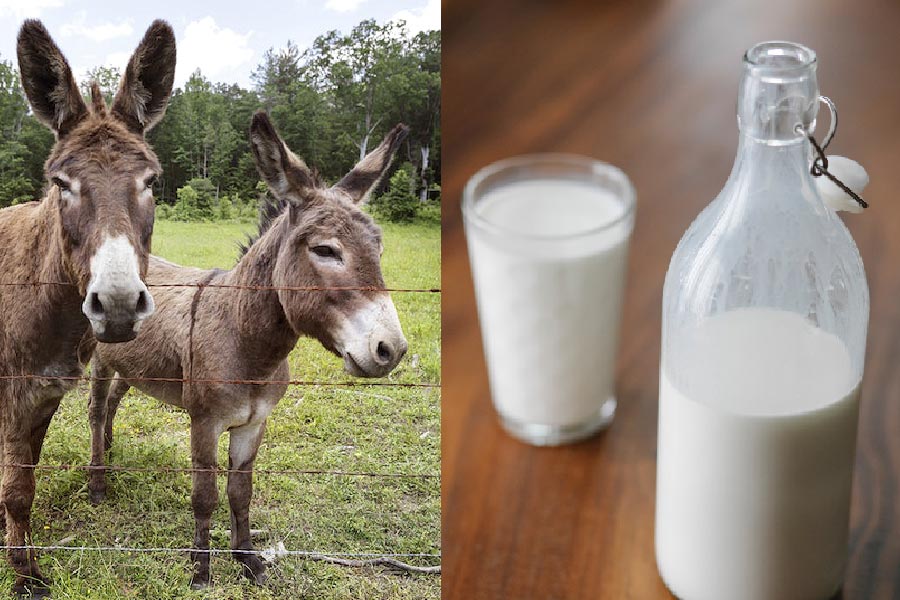Humans have used donkey milk for various reasons for thousands of years. We know, of course, that donkeys have been used for their strength and ability to carry heavy, cumbersome loads for long distances. But the jennies were also used for their milk. Historically, even figures like Hippocrates, Cleopatra, and Ovid are known for having used donkey milk. Today, donkey milk is quickly becoming a more frequently sought-after option for the purposes of both consuming it for its nutritional benefits and for its cosmetic benefits.
If you were able to ask Hippocrates or Cleopatra, “What are the benefits of donkey milk?” or “Why do you use donkey milk?” they would each have a different answer for you. But they would probably both be right since there are so many benefits. The benefits include beneficial nutrients for our diets, amazing properties for our skin, and more.
Historical uses
Hippocrates, an ancient Greek physician, not only used donkey milk himself but he also prescribed it to many of his patients for a number of ailments. He believed that it helped people suffering from liver disease, fevers, infections, wounds, and even poisoning.
On the other hand, Cleopatra, a Queen of the Ptolemaic region of ancient Egypt, is believed to have bathed in donkey milk to help her maintain smooth and soft skin. Even the ancient Roman poet Ovid recommended that donkey milk be applied to the skin to improve its appearance.
Milk alternative
One of the main reasons for donkey milk’s popularity is that it is a milk that most closely resembles human breast milk. In fact, in the 19th century, it became a popular and successful option for providing milk to infants who had been orphaned or were without a mother. It is still commonly seen in its freeze-dried powdered form in Italy as an infant formula.
The protein profile and lactose content are a few aspects that are most similar to human breast milk. It is also known to stimulate the intestine’s absorption of calcium and helps encourage the growth of enteric flora or good bacteria in the gut. It is also known for containing anti-inflammatory properties.
More people are focusing on alternative kinds of milk like donkey milk, thanks to our increased understanding of food allergies. It is also much lower in fat and calories than other kinds of milk and contains a higher vitamin D content.
It is a popular choice for those with a cow’s milk protein allergy. In fact, in Italy, a study with 81 children who had cow’s milk protein allergy found that all 81 of the children found success in drinking donkey milk instead. They didn’t suffer from any allergic responses, and they were able to get back to normal weight and height gains for their ages, thanks to the donkey milk.
Unfortunately, since donkey milk does still contain lactose, it is not an appropriate substitution for people with lactose intolerance. A lactose-free milk would be needed instead. Though some people with lactose intolerance do report that donkey milk causes significantly less discomfort for them as compared to milk from cows.
What are the benefits of donkey milk?
While there are many benefits associated with using donkey milk, the major ones are related to its nutritional and cosmetic properties.
Nutrition
Donkey milk is a wonderful source of nutrition. There are so many health benefits. Donkey milk is also known to improve your immune system. One study found that donkey milk stimulates the release of cytokines, proteins that are well-known for stimulating or boosting the immune system.
The same study discovered that donkey milk could actually help reduce blood pressure. Consuming donkey milk causes the cells in the body to produce a compound called nitric oxide. Nitric oxide is known to help improve blood circulation, which can help with blood pressure. Moreover, it is believed to help improve the intestine’s absorption of calcium. And it helps encourage the growth of enteric flora in the gut.
Cosmetics and skin care
Donkey milk is not only used for its nutritional benefits. It is also used in cosmetic or personal care products. Skin creams or lotions, face masks, soaps, and shampoos are just a few examples. Some of the proteins found in donkey milk attract and retain water. This is why it is an ingredient in many moisturizers.
Similarly, some of the proteins found in donkey milk work as antioxidants which help reduce the risk of cells being damaged by oxidative means like sun exposure. For this reason, it is sometimes used in skin creams that boast anti-aging benefits. It also is known for its vitamin C content which helps improve collagen production in the skin and helps improve the overall tone of the skin.
How to include donkey milk in your diet?
One of the ways to include donkey milk in your diet is by drinking it. You can drink raw donkey milk so long as it has been boiled first. Raw donkey milk will keep for up to three days in the refrigerator. You can also drink pasteurized donkey milk, which has a lower risk of pathogen contamination. Finally, another option is to use freeze-dried donkey milk powder. All you have to do is add water to the powder. It has a shelf-life of up to two years and is safe to consume.
Cons of donkey milk
One of the very few downfalls of donkey milk and the reason it isn’t more popular is that it is expensive and hard to find. Most farm operations in the United States are only milking between five and thirty jennies. Per day, each jenny can only produce about four cups total of milk. On the other hand, dairy cows produce between six and eight gallons of milk per day. Quite a difference from a measly four cups.
Larger donkey farms may sell pasteurized donkey milk but smaller scale farms usually only seem to sell raw milk. Raw milk poses a risk of containing bacteria or other bad toxins that can be harmful to humans, especially those with a compromised immune system.
It is illegal in the United States to transport raw milk across state lines, so it can be quite hard to get. In Europe, however, it is more widely available, but this is usually only in the freeze-dried powdered form. And again, because jennies don’t produce a significant amount of milk, it can still be very expensive.
Conclusion
There are, without a doubt, many benefits to donkey milk. The only downside is that donkey milk can be expensive and hard to come by. Donkey milk provides an option for people who are allergic to cow’s milk. Donkey milk has even been used to feed babies in need of milk. It provides all the nutrition required for the babies, thanks to its similarity to human breast milk.
For those who choose to drink donkey milk, it provides many health benefits like boosting the immune system, reducing high blood pressure, and improving calcium absorption. Though it can be expensive, it is not hard to see why donkey milk has been so popular throughout the centuries and why it is making a comeback today.





![What Are Mules Used For? [How Are They Better?] what are mules used for](https://donkeyonfarm.com/wp-content/uploads/2023/08/preview16_11zon-270x180.jpg)
![What are the Differences Between a Mule and a Hinny? [Which is Better?] difference between a mule and a hinny](https://donkeyonfarm.com/wp-content/uploads/2023/08/difference-between-a-mule-and-a-hinny-270x180.jpg)